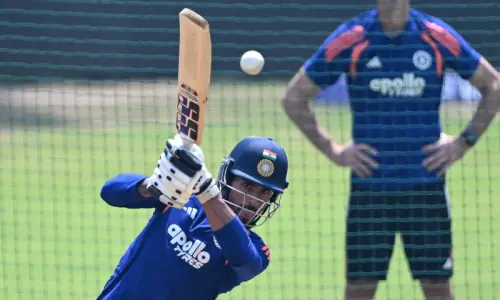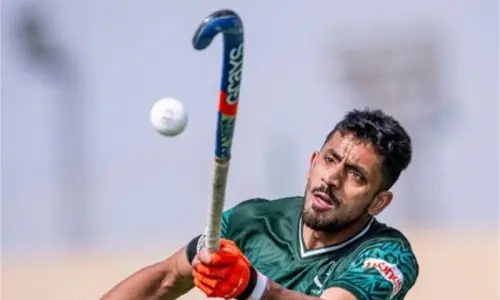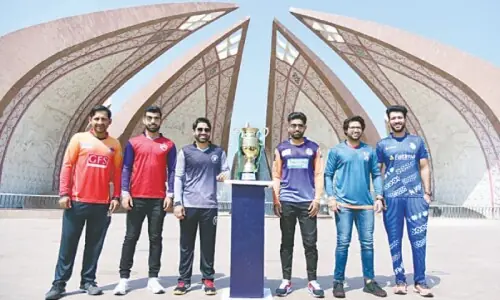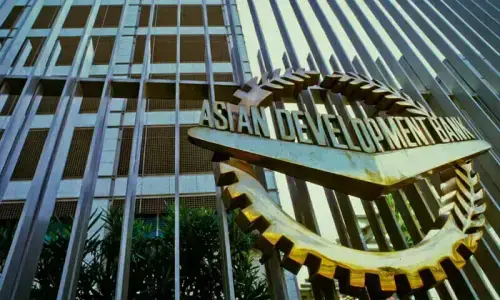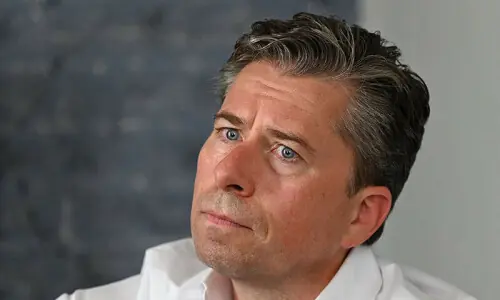 |
Imagine a football World Cup without Brazil or an international table tennis event without China. Impossible? Perhaps, but never underestimate the emergence of the implausible and the impossible in sport. Had someone imagined a hockey World Cup without Pakistan 25 years ago, he would have been declared a nutjob.
But in 2014 this has actually happened. For the first time in the history of the event, there is no Pakistan team participating. A former Dutch player recently couldn’t believe there was no team from Pakistan in this year’s hockey World Cup.
Pakistan’s sad absence from field hockey’s grandest event comes with a couple of ironies as well. When last year Pakistan failed to qualify for the event, it was a country whose former hockey chief, Nur Khan, was the one who had actually aired and launched the idea of hosting a hockey World Cup.
As President of the Pakistan Hockey Federation (PHF), Nur Khan was the first senior hockey official who had floated the idea of organizing field hockey’s very own World Cup.
He took his idea to the international body of hockey in 1969 and they approved it right away. What’s more, Pakistan was chosen to hold field hockey’s first ever World Cup in 1971. The event was however moved to the Spanish city of Barcelona when the political situation worsened in East Pakistan due to violence between the state and Bengali nationalists.
The other teasing irony that came with Pakistan’s ouster from this year’s World Cup is the fact that the Pakistan hockey team has won the event for a record 4 times. It reached the finals on 6 occasions.
Pakistan in Hockey World Cups (1971-2010)
Barcelona 1971
The first ever hockey World Cup was held in Barcelona, Spain in 1971. A total number of 10 teams qualified for the event and were broken up into two groups. Pakistan, India, West Germany and the Netherlands were the top four sides in the world at the time.
The remaining teams in the tournament were hosts Spain, Argentina, Australia, Japan, France and Kenya.
Group A was topped by India. Kenya pulled off a surprise win against West Germany and managed to enter the semi-finals from this group along with India.
Group B was topped by Spain and Pakistan and both the teams advanced into the semi-finals.
In the first semi-final Pakistan ousted India 2-1 in a tense and closely contested game. In the second semi-final Spain played safe and defeated a spirited Kenya 1-0 to enter the finals against Pakistan.
In the final Pakistan scored early but then strengthened its defense to hold out a 1-0 victory and win the first hockey World Cup. This way Pakistan also retained its number one position in the world hockey rankings, closely followed by India and the Netherlands.
 |
| Pakistan scores its solitary (and winning) goal against Spain in the final. |
 |
| Pakistan captain receives the World Cup trophy. |
Amstelveen 1973
The second hockey World Cup was held two years later in the Netherlands’ scenic town of Amstelveen.
 |
| An Indian player dodges the ball past a Pakistani player in the semi-final. India won the game 1-0. |
Pakistan, India, Netherlands and West Germany were still considered to be the top four sides in the world. 12 teams qualified for the 1973 event. Apart from the top four, also present were Spain, New Zealand, Kenya, Japan, Belgium, England, Argentina and Malaysia. Australia who would begin to rise as a hockey power from the early 1980s onwards failed to qualify.
Pool A was topped by West Germany and India. The 1971 finalists, Spain, were knocked out. Pakistan swept Pool B topping it with the Netherlands and entering the semi-finals.
In the first semi-final the Netherlands and West Germany held on to a 0-0 draw but Germany lost the game on penalty strokes. India downed Pakistan 1-0 in the second semi-final to avenge its defeat at the hands of the Pakistanis in the 1971 semi-finals.
The final between the Netherlands and India swung to and fro like a pendulum and the match ended in a 2-2 draw. However, India lost on penalty strokes and the Netherlands became hockey’s new world champions.
It also rose to number one in world rankings followed by India, Pakistan and West Germany.
 |
| The Dutch on the attack against the Indians in the final. |
 |
| A Dutch player is carried on the shoulders by the fans after the Netherlands won the final. |
Kuala Lumpur 1975
The capital of Malaysia, Kuala Lumpur, was the venue of the third field hockey World Cup. Once again 12 teams qualified for the event with India, Netherlands, Pakistan and West Germany being the top four sides in the world at the time.
Poland and Ghana were the new entrants and they joined the top four along with Spain, Argentina, England, Australia, New Zealand and hosts Malaysia to compete for the prestigious world hockey title.
Pakistan and Malaysia topped Pool A ousting the 1973 champions, Netherlands, who finished fifth in the pool.
Pool B was topped by India and West Germany and both the teams advanced into the semi-finals to play against Netherlands and Pakistan.
In the first semi-final, Pakistan thrashed West Germany 5-1 to enter the final, whereas India inched past Malaysia 3-2 in the second semi-final.
The Pakistan-India final was watched by over 40 thousand hockey fans at the stadium, and the state-owned channels in both the countries beamed the match live (a rarity in those days).
The tense match that was marred by frequent clashes between the two sets of players was tied 1-1 for most of the time but was finally won by India 2-1 giving India its first ever World Cup title.
 |
| The Kuala Lumpur Airport with banners welcoming the teams arriving for the World Cup. |
 |
| India and Pakistan battle it out in the final. |
 |
| The triumphant Indian team is welcomed by a huge crowd on its return to India. |
Buenos Aires 1978
The fourth hockey World Cup was held in Argentina’s capital, Buenos Aires, in 1978. In the years leading up to the event Pakistan had managed to become the number one team in hockey world rankings followed by the Netherlands and West Germany. India had fallen by the wayside after their 1975 victory in the final.
The Pakistan team reached Buenos Aires via the United States and was placed in Pool B with Netherlands, Spain, Argentina, Malaysia and new entrants, Ireland and Italy.
Pool A consisted of West Germany, India, Australia, England, Poland, Belgium and first-timers Canada.
Australia topped Pool A followed by West Germany. 1975 World Cup victors, India, were ousted.
Pakistan topped its pool by winning all of its six matches. It entered the semi-finals with the pool’s second-best team, the Netherlands.
In the first semi-final, the Netherlands downed a rapidly improving Australia 3-2. In the second semi-final Pakistan held on to a slim 1-0 lead against West Germany as the Germans lost their third consecutive World Cup semi-finals.
In the tough and tense final between Pakistan and Netherlands, Pakistan managed to score the winning goal in the dying moments of the game to take the game 3-2. In the process Pakistan lifted its second hockey World Cup title.
Interestingly, the same year’s football World Cup was also held in Argentina (right after the hockey World Cup) and the Netherlands managed to make it to the final there as well but was defeated by hosts Argentina.
 |
| Pakistan captain Islahuddin with the 1978 World Cup trophy. |
 |
| Official brochure of the 1978 World Cup. |
 |
| The special stamp that was issued by the government of Pakistan to mark Pakistan’s victory. |
Bombay (present-day Mumbai) 1982
The fifth field hockey World Cup was held four years (instead of two years) later in the sprawling Indian city of Bombay. Though the Astroturf had been introduced in hockey during the 1976 Olympics in Montreal, hockey World Cups were still being played on grass.
This meant that the Asian sides such as Pakistan and India still held the advantage because over the years they had mastered the skills required to play well on grass.
12 teams qualified for the event that was watched by large crowds at the stadiums and by millions on TV.
The Soviet Union made its first appearance in a hockey World Cup.
Pakistan, Netherlands, Australia and West Germany were the top four teams in the world at the time.
Pakistan topped Pool A by winning all of its 5 matches. It was followed into the semi-finals by West Germany.
Pool B was topped by Australia followed by the Netherlands. India was ousted despite managing to win 3 of its 5 matches.
In the first semi-final Pakistan downed the Netherlands 4-2 to enter the final and defend the title.
In the second semi-final West Germany finally managed to make it to a hockey World Cup final by defeating Australia on penalty strokes. Both the teams had been locked at 3-3 during normal time.
In the final Pakistan sprinted past West Germany 3-1 to win its third (and second consecutive) hockey World Cup title. It had won the trophy in 1978 by winning all of its matches and here too it managed to win each and every match that it played to win the Cup.
 |
| Pakistan team with the World Cup trophy in Bombay. |
 |
| The Pakistan team pose for photo during a training session in Bombay. |
 |
| Pakistan captain, AkhtarRasool, shows the trophy to the crowds gathered at Lahore Airport. A group ofsome famous Pakistani film actors and actresses can also be seen who had traveled to India to watch the final. |
London 1986
The first hockey World Cup to be played on Astroturf was held in London in 1986. By then Pakistan’s ranking had slightly slipped from number 1 to number 3, whereas Australia and West Germany had gone on to take the number 1 and 2 positions respectively.
But Pakistan’s campaign during the London event turned out to be a disaster. In the 12-team-tournament, it could only manage to win two matches (out of six) and achieve the 11th position. Interestingly it defeated India to achieve the second-last position leaving India to come last. Both the former hockey giants had fallen badly.
England rose to become a notable hockey-playing nation and it entered its first hockey World Cup final by defeating West Germany in one of the semi-finals. Australia thrashed the Soviet Union in the second semi-final (5-0) and then went on to defeat England 2-1 to lift its first ever hockey World Cup.
Pakistan was being led by the immensely talented and skillful Hassan Sardar (who had been named player of the Bombay World Cup event). The team’s performance came as a shock to the fans and the government immediately ordered an inquiry into the debacle.
Pakistan cricket had been steadily rising from the late 1970s and much of the sponsorship money was going in to bolster the cricket team and tournaments. During the inquiry the hockey players lamented that they were not being paid even half of what the cricketers were getting as playing fee and that very few companies were interested in sponsoring the Pakistan hockey team.
PHF decided to (slightly) raise the playing fee of the hockey players and encouraged private and state-owned companies to sponsor and invest in what was still Pakistan’s national sport.
 |
| Australian captain kisses his team’s first World Cup trophy. |
 |
| Hassan Sardar during Pakistan’s pool match against the Soviet Union. Pakistan lost 2-0. |
 |
| The 1986 World Cup promotional leaflet. |
Lahore 1990
In 1990 Pakistan’s historic city, Lahore, held the 7th hockey World Cup (first ever to be held in Pakistan). It was played on a freshly laid Astroturf in Lahore’s main hockey stadium.
After the 1986 World Cup debacle, Pakistan had slowly crawled back into the top four rankings that were now dominated by Australia, Netherlands and West Germany.
12 teams qualified for the event that was watched by huge crowds. Pool A was topped by 1986 World Cup champions, Australia, followed by West Germany. India lost 4 of its 5 games in the pool and came last behind France, Soviet Union and Argentina.
West Germany and Pakistan topped Pool B ousting Spain, Canada, Ireland and 1986 finalists, England.
It seemed the Pakistan team had finally managed to come to terms with playing on the much quicker Astroturf that required more power-play than just skill.
In the first semi-final the Pakistan team left the huge crowd erupting with joy and cheers when it edged past 1986 champions, Australia, 2-1 in a hard-fought game.
In the second semi-final (another tense and hard-fought match), Germany were downed by a resurgent Netherlands 3-2.
But the final turned out to be an anti-climax when the Dutch with their power hitting and capability of converting penalty corners into searing goals pushed aside the Pakistanis 3-1 to win its second hockey World Cup title after it had first won it in 1973.
Though Pakistan lost, it did manage to become the number 2 ranked team after Netherlands, with Australia slipping to number 3.
Indeed, Pakistan hockey was back on track.
 |
| Pakistan team in a huddle before its semi-final game against Australia. |
 |
| The huge Lahore crowd goes quiet as Netherlands down Pakistan in the final. |
Sydney 1994
Pakistan hockey had managed to rebound well from the sudden fall it had experienced during the 1986 World Cup. It was among the world’s top four hockey playing nations when it arrived in Sydney, Australia, to take part in the 8th hockey World Cup.
It was placed in Pool A with hosts Australia, England, Argentina, Spain and new-comers, Belarus (a former part of the Soviet Union that had crumbled in 1991).
In Pool B were reigning champions Netherlands with Germany, India, South Korea, Belgium and first-timers, South Africa. West Germany and East Germany had merged to become a single entity and the sporting boycott of South Africa had ended after the fall of the white apartheid regime and system there.
Pakistan and Australia topped Pool A to enter the semi-finals and Pool B was topped by Netherlands and Germany.
In the first semi-final, Netherlands defeated Australia 3-1 to enter its second consecutive World Cup final. The second semi-final was a tighter affair with Pakistan and Germany holding on to a 1-1 draw. But Pakistan saw itself advancing into its sixth World Cup final after it went past the Germans on penalty strokes. Just as the 1990 final, the 1994 final too pitched the Dutch against the Pakistanis. Both the teams fought hard on the field, combining attack with strong defense till the game ended in a 1-1 draw. Extra time too did not yield a result and the matter came down to deciding the game on penalty strokes (5 each).
Pakistan managed to inch past the Dutch 4-3 and win their fourth hockey World Cup title. The win also put Pakistan at the top of hockey world rankings, followed by Netherlands, Australia and Germany.
 |
| Pakistani players celebrate after scoring a goal against Argentina in a pool match. |
 |
| TV grab of Pakistani fans invading the field after Pakistan beat Netherlands in the final. |
 |
| Young Pakistani captain Shahbaz Ahmed, with the World Cup trophy. |
Utrecht 1998
The 9th field hockey World Cup was held in the Dutch city of Utrecht in 1998. Pakistan had by now slipped to 4th position in the hockey world rankings with Netherlands, Germany and Australia taking up the top three positions.
Germany and Netherlands easily toppled Pool A that also had Canada, South Korea, New Zealand and India. India came last in the pool.
In Pool B Australia and a resurgent Spain managed to edge out former champions, Pakistan. Also in the pool were England, Poland and Malaysia. Pakistan’s fate was sealed by the game that it lost against Spain 2-1.
Netherlands whipped Australia 6-2 to enter its third consecutive World Cup final. In the second semi-final Spain surprised the Germans by outclassing them 3-0 and entering its second ever World Cup final after 1971.
 |
| A Dutch fan outside the stadium. |
 |
| The crowd gathers for the Netherlands-Spain final. |
In a tough (and rough) final, the Dutch managed to edge past the spirited Spaniards 3-2 to win their third hockey World Cup title.
Kuala Lumpur 2002
The Malaysian capital, Kuala Lumpur, held its second hockey World Cup in 2002. For the first time a record number of 16 teams were given the chance to qualify for the prestigious event.
Pakistan that at the time was placed at number 5 in the world hockey rankings joined Germany, Netherlands, Argentina, Spain, New Zealand, Belgium and South Africa in Pool A.
Pool B comprised of Australia, South Korea, Malaysia, England, Japan, India, Poland and new entrants, Cuba.
Pakistan finished 4th in its group from which the top two teams, Germany and Netherlands, proceeded to the semi-finals. Australia and a reemerging South Korea topped Pool B.
Germany went past South Korea 3-2 in the first semi-final and the second one was easily won by Australia 4-1 against the Dutch.
By defeating Australia 2-1 the Germans finally won their first ever hockey World Cup.
 |
| Traditionally dressed Malaysian women unveil the World Cup trophy. |
 |
| A Malaysian striker tries to score against Japan. |
 |
| Pakistan’s Shahbaz Ahmed in action against Belgium. |
 |
| Germans celebrate their first ever World Cup trophy. |
Mönchengladbach 2006
The 11th hockey World Cup was held in the German city of Monchengladbach in 2006. 12 Teams qualified for the event. Pakistan was placed in Pool A where it could win just one of its five games.
Australia, Spain, Germany and South Korea made it to the semi-finals. The final was played between Australia and Germany. It was won by Germany 4-3 who went on to win its second consecutive hockey World Cup title.
 |
| Germany and Spain battle it out in their semi-final match. |
 |
| The Germans celebrate their second World Cup title. |
New Delhi 2010
It was during the 12th hockey World Cup in New Delhi where Pakistan’s steady decline as a former hockey giant hit rock-bottom.
It finished last in the 12-team event and for the first time in its hockey history it was thrown out from the top 5 rankings, barely managing to stay afloat in the top 10.
The 2010 World Cup title was won by Australia.
Interesting Pakistan Hockey Trivia
• The first major hockey event to be won by the Pakistan hockey team was the Olympic gold medal in Rome in 1960. Pakistan would go on to win two more hockey gold medals in Olympics (in 1968 and 1984).
 |
| Front page of DAWN highlighting Pakistan’s first major victory in hockey (1960). By the way, Pakistan were Olympic champions and not ‘world champions.’ |
• Pakistan is the only hockey-playing nation that has won the hockey World Cup title 4 times. It has reached the finals 6 times. Also, it is the only hockey team with multiple hockey titles to its name that failed to qualify for a World Cup (2014).
• The idea to launch field hockey’s own World Cup event was first suggested by PHF’s chief, Nur Khan. He was also instrumental in launching the second most prestigious hockey event, the Champions Trophy (in 1978). The first Champions Trophy was held in Pakistan.
• Between 1978 and 2012 16 Champions Trophy tournaments have been held. 10 of them have been held in Pakistan (5 each in Lahore and Karachi).
• Pakistan has won the Champions Trophy 3 times (1978, 1980, 1994).
• Pakistan has appeared 13 times in Asian Games (between 1958 and 2010). It has won the hockey gold medal at the Asian Games for a record 8 times.
 |
| Pakistan’s Samiullah and India’s Harcharan Singh during the opening ceremony of the 1974 Asian Games in Tehran, Iran. Pakistan defeated India in the hockey finals of the games. |
• There have been 8 Asia Cup events in hockey (between 1982 and 2013). Pakistan won the first three.
• Another prestigious hockey tournament was introduced in 1983, the Sultan Azlan Shah Cup. Pakistan has won it 3 times.
• The art and skill of ‘dribbling’ the ball with the hockey stick was first invented in the late 1950s by Pakistani and Indian hockey players. Mastering the dribbling technique gave India and Pakistan advantage over most teams because this technique was most effective on grass. However, with the introduction of the Astroturf, dribbling began to be overshadowed by power hitting which non-Asian sides were better at.
 |
| Pakistan and Indian players used to rely more on skill than power. |
• Converting penalty corners into goals was one of the Pakistan hockey team’s main weaknesses during its hey days. As Pakistanis relied more on scoring field goals, European sides depended on powerful penalty corner strikers. The only penalty corner hitter of note produced by Pakistan was the hefty Tanveer Dar. He played for Pakistan between the early 1960s and early 1970s. It took Pakistan another two decades to finally discover a truly powerful penalty corner expert in the shape of Sohail Abbas. Abbas made his international debut in 1998 and holds the record of scoring the most goals by any player in the world.
 |
| Sohai lAbbas: Pakistan’s penalty corner machine. |
• Two Pakistan hockey players, Islahuddin (1967-1978) and Samiullah (1972-84), were once considered to be the fastest movers on the hockey field. During the 1978 World Cup, Islauddin was pronounced by experts to be the fastest ‘dasher’ – the player who led the dash towards his opponents during a penalty corner to blunt their corner hit. Samiullah’s running was so swift and quick that (in 1976), the Pakistan Sports Board even considered him to represent Pakistan as a 100-meters sprinter during the 1976 Olympic Games in Montreal. Samiullah was nicknamed ‘the Flying Horse.’
• Hockey was Pakistan’s most popular game between 1950s and early 1980s. It enjoyed a brief resurgence in the early 1990s before completely being overshadowed by cricket.
• The first Astroturf in Pakistan was laid in Karachi’s main hockey stadium, the Hockey Club of Pakistan, in 1979.
• The tradition among many Pakistani sportsmen of doing the ‘sajda’ (prostrating and/or going down on ones knees and touching the forehead on the ground to thank the Almighty), was first popularized by the Pakistan hockey team after it beat India in the final of the 1974 Asian Games in Tehran. Interestingly, this act was soon adopted by the Sikh players of the Indian hockey side when (after beating Pakistan in the final of the 1975 World Cup), they went down on their knees and kissed the ground. About two decades later some of the Pakistani cricket and squash players also adopted the tradition.
 |
| The ‘Flying Horse’ in 1976. |
 |
| The act of prostrating (to thank the Almighty) after achieving a sporting milestone was first introduced by Pakistan hockey team in 1974. It was later adopted by some Pakistani cricket and squash players as well. |
• Pakistan’s center-forward, Hassan Sardar, was considered to be the most dexterous and skillful player in the world during the 1982 World Cup.
 |
| The wily Hassan Sardar breaks through Indian defense during the Pakistan-India final in the 1982 Asian Games in New Delhi. |
• Though the Pakistan cricket teams often come under the microscope and nosiness of the tabloids for their flamboyant and colorful lifestyles and habits, the Pakistan hockey team faced its first major postmortem in this context when it performed miserably at the 1986 World Cup in London. Pakistani tabloids claimed that the players were spending their nights at nightclubs before important games and that the team had underperformed on purpose to exhibit its protest against PHF that was not paying the hockey players the kind of playing fee that the cricket board was giving to the cricket players. It was true that the players were unhappy over the payment issue, but it was also true that the Pakistan hockey team had lost all form during the tournament. Also, though many Pakistani hockey players enjoyed as much of a night lifeas the cricketers did, since the Pakistani hockey team consistently performed well between 1968 and 1983, the tabloids could never turn some of the players’ flamboyant off-the-field escapades into scandals.
• When Pakistan lost the hockey final of the 1972 Munich Olympics against Germany, its players openly accused the umpires of cheating. When the players were awarded their silver medals, many of them threw the medals on the ground and began to play with them with their hockey sticks.
• On most occasions Pakistani hockey players were considered and appreciated (in Europe) for being extremely skillful, friendly and sociable. It was European sides, especially West Germany, that were notorious for playing rough. In 1973 however, emerged a wayward hockey genius called Safdar Abbas. A powerful striker of the hockey ball and skillful mid-fielder, Abbas was also extremely hotheaded. Not only did he occasionally clash with the opponents, but sometimes ended up brawling with his own teammates! That’s why he kept falling in and out of the team, finally bidding farewell to the game in 1981.
• Just as some Pakistani cricketers, at least two Pakistani hockey stars joined politics after retirement: Former Pakistan captain, AkhtarRasool (1971-82) joined the moderate right-wing party the PML-N in the 1990s and another Pakistani captain, Qasim Zia (1980-87), joined the populist left-leaning PPP.
• Just like the Pakistan cricket teams (between 1950s and late 1980s), a bulk of Pakistani hockey teams too were made up of players from Karachi and Lahore. And as more players from smaller cities and towns began to get selected for the Pakistan cricket team from the 1990s onwards, the hockey squad began to receive more players from Punjab’s other cities as well. Karachi’s supply to hockey remained consistent though.
• The wave of religiosity that swept the Pakistan cricket team between 2003 and 2007 never reached the hockey squad.
• Two schools that have done the most to popularize hockey among young Pakistanis are Karachi’s Habib Public School and the (now defunct) Cantt Public School. Hockey was aggressively promoted among students at the Habib Public School so much so that playing cricket at the school remained banned till the mid-1980s! HasanSardar, Safdar Abbas and Sohail Abbas are some of the Pakistani hockey stars who graduated from the Habib Public School. Ironically so did former Pakistani cricket opener, Shoaib Mohammad!
Sources: A Dash Through My Life: An Autobiography: Islahuddin (Pakistan Press, 2010) Going for Gold: Pakistan At Hockey (Oxford University Press, 1997) DAWN reports on various Pakistan hockey matches between 1971 and 1998. JANG Sports pages (1971-84) Akhbar-e-Watan (1975-89)




